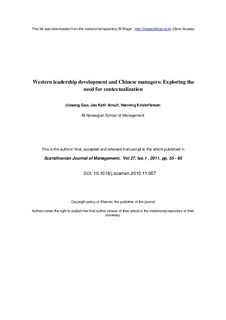| dc.contributor.author | Arnulf, Jan Ketil | |
| dc.contributor.author | Gau, Jinsong | |
| dc.contributor.author | Kristoffersen, Henning | |
| dc.date.accessioned | 2011-03-07T09:04:18Z | |
| dc.date.available | 2011-03-07T09:04:18Z | |
| dc.date.issued | 2011 | |
| dc.identifier.citation | Scandinavian Journal of Management, Vol.27 (2011), p. 55-65. | en_US |
| dc.identifier.issn | 0956-5221 | |
| dc.identifier.uri | http://hdl.handle.net/11250/93678 | |
| dc.description | Authors' final version of the article ("Final draft post refereeing") | en_US |
| dc.description.abstract | This paper explores if, and how, Chinese managers perceive Western
theories of leadership and leadership development as useful in their
business environment. Based on a text analysis approach analyzing term
papers of 171 MBA students, this study finds that virtuous leadership is
valued the most, whereas authoritarian leadership is valued the least.
The respondents are oriented both towards traditional Chinese
philosophy and Western leadership theories, and predominantly view
leadership development as a necessary contribution to the improvement
of Chinese organizations. Concerning the identification and assessment
of leadership potential, Western techniques are predominant; sometimes
with controversial effects. The study concludes that leadership
development techniques need to be adapted to the national context and
recommends the role of espoused leadership in cross-cultural MBA
classes for future research. | en_US |
| dc.language.iso | eng | en_US |
| dc.publisher | Elsevier | en_US |
| dc.subject | MBA education | en_US |
| dc.subject | Leadership | en_US |
| dc.subject | Chinese management | en_US |
| dc.subject | Cultural differences | en_US |
| dc.subject | Leadership development | en_US |
| dc.title | Western leadership development and Chinese managers : Exploring the need for contextualization | en_US |
| dc.type | Academic article | en_US |
| dc.source.pagenumber | 55-65 | en_US |
| dc.source.journal | Scandinavian Journal of Management, | |
| dc.identifier.doi | 10.1016/j.scaman.2010.11.007 | |
